Omada’s New Food Experience: A “Powerful Example of Tech and Human Care Working in Tandem.”
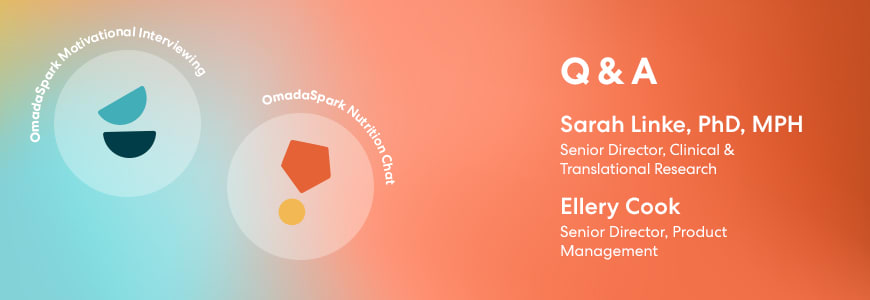
According to Omada Health’s product team-led survey conducted last year, 49% of members said they don’t have a plan for what they’ll eat each day. Given how busy people’s lives are, this didn’t come as a shock. Regardless, it’s noteworthy, as some studies have shown planning meals to be associated with a healthier diet. When people are seeking timely support with something like meal planning, they have plenty of options in the age of generative AI.
Theoretically, online AI tools and even social media accounts can help provide a week’s worth of meal ideas or a grocery list out of thin air. But are these off-the-shelf tools armed with the proper context? Are they trained on clinically-validated sources? Are they fully trustworthy?
The Omada product team’s extensive member research helped inspire Nutritional Intelligence, Omada’s new in-app food experience. They also leveraged robust member data insights, Omada’s registered dietitian nutritionists (RDNs), clinical research scientists, and applied AI experts to develop the experience’s new, easy-to-use AI-supported nutrition features. We spoke with Omada’s Senior Director of Clinical and Translational Research, Dr. Sarah Linke, PhD, and Senior Director of Product Management, Ellery Cook, to delve deeper into how these features work, their value for members, and how they compare to competing AI tools in the market.
Delivering Support in Real Time with OmadaSpark
Omada Health: Can you tell me about how Omada members can access nutritional support in this new in-app experience?
Ellery Cook: Absolutely. We’re excited to talk about OmadaSpark, the AI-supported nutrition education chat bot that answers food and nutritional questions in real time.
Sarah Linke: Members can interact with OmadaSpark to ask for a last-minute dinner idea when they’re standing in the kitchen after work, or what to eat and how to best hydrate while managing common GLP-1 side effects.
EC: OmadaSpark can help answer questions for a wide range of member profiles. For example, when a member asks, it can highlight meat-free lean protein sources for a vegetarian, summarize daily protein recommendations for a GLP-1 user, and suggest foods that can help with lowering cholesterol and limiting sodium for members with hypertension.
SL: The best part is that our human care teams get summaries of a member’s interactions with OmadaSpark, which helps the care teams support the member fully. So, you're really getting the best when you think about humans plus AI––the best of both worlds. You're getting that relationship and rapport-building from humans, with no drops in connection.
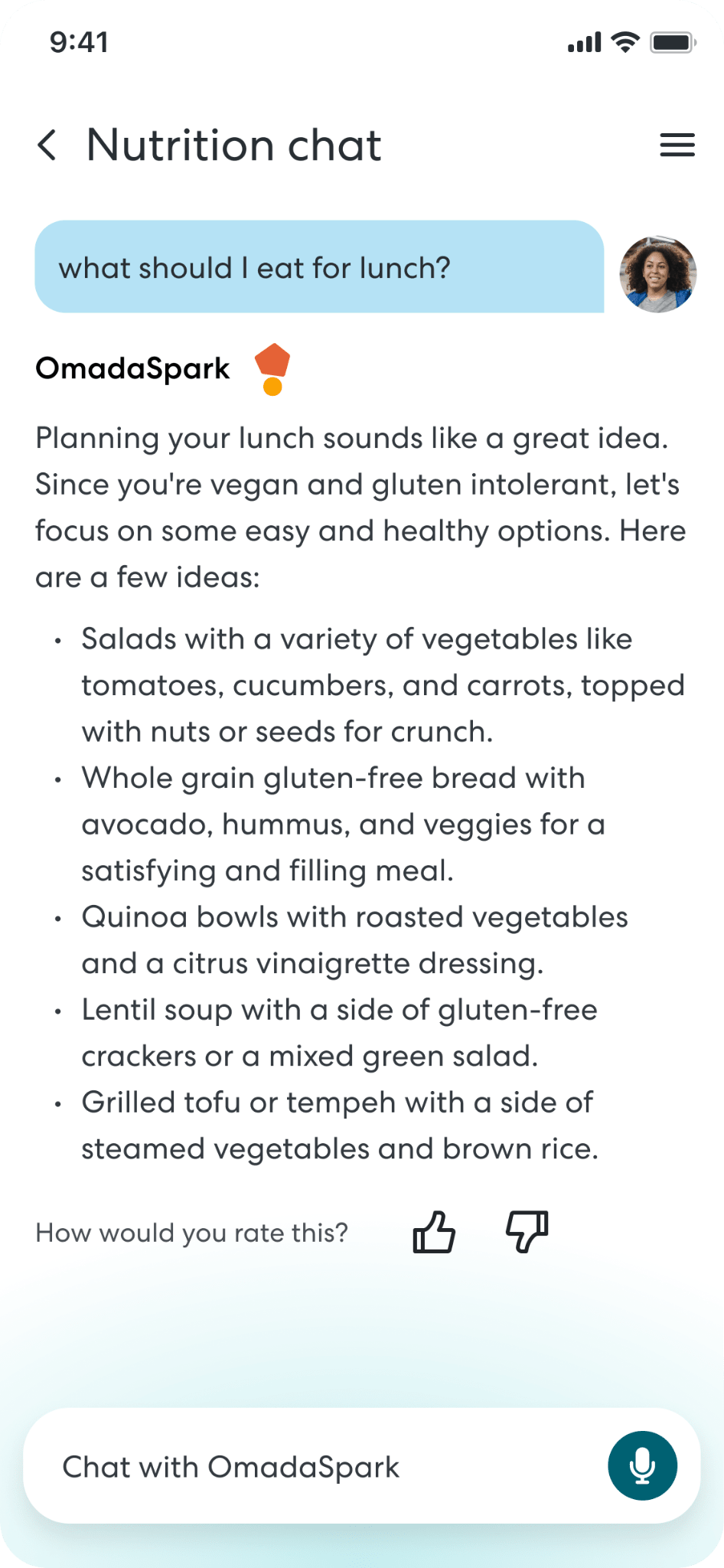
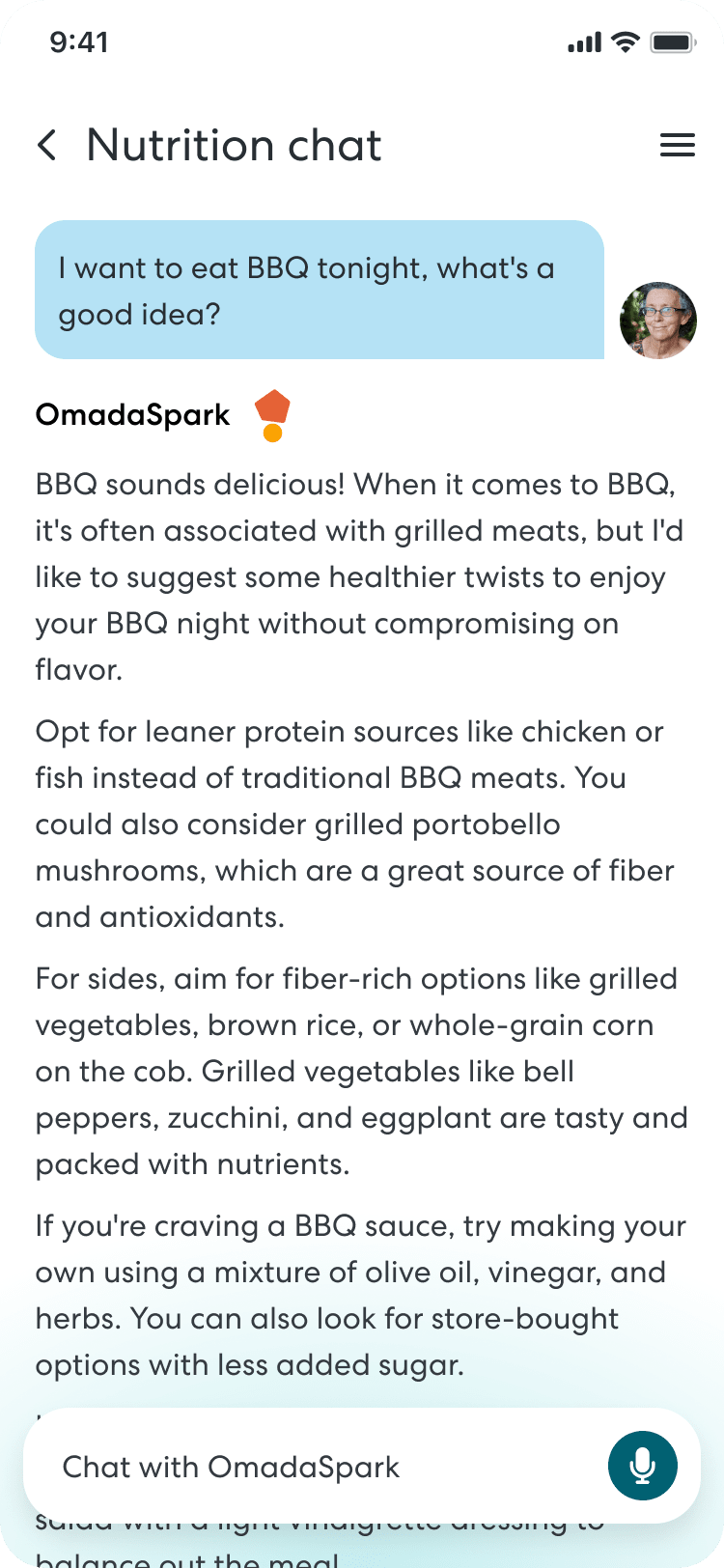
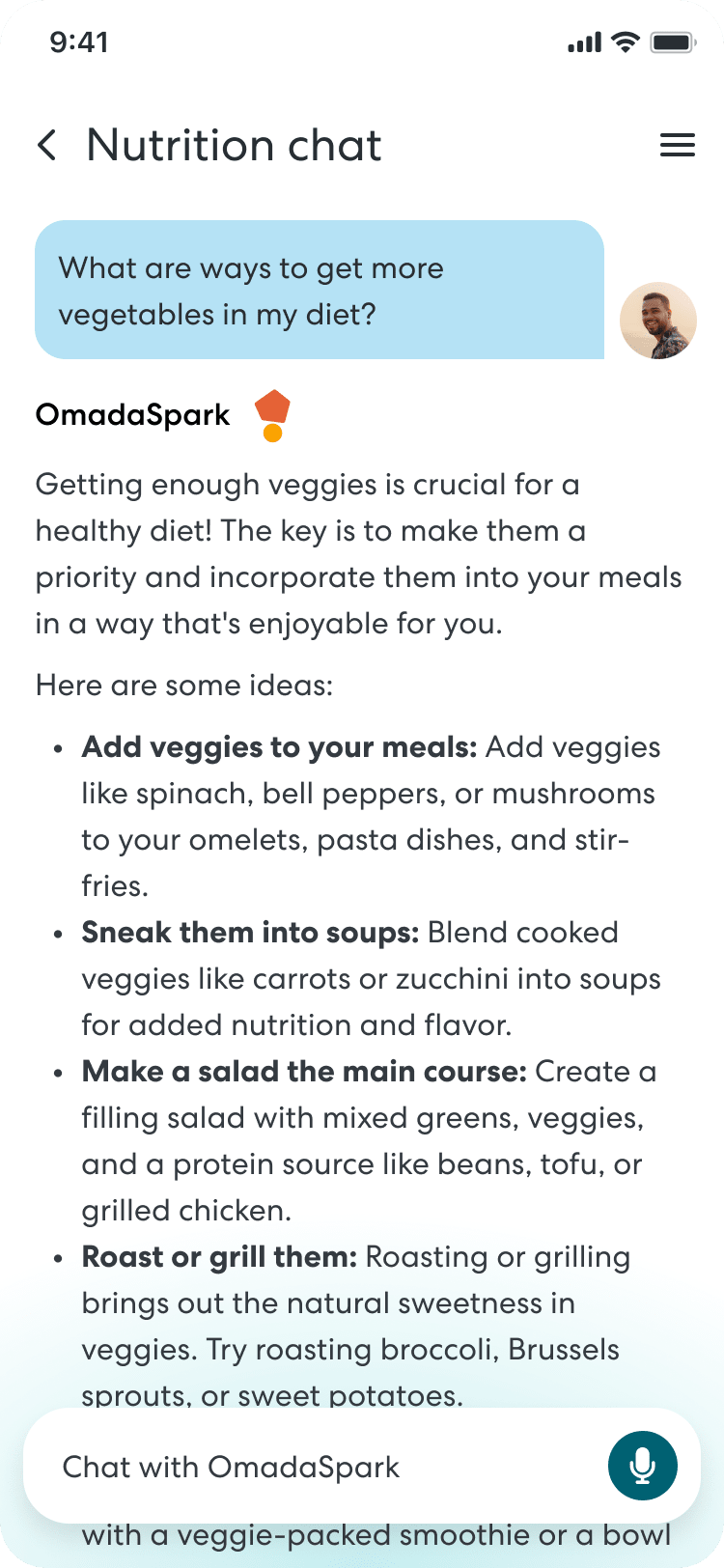
OmadaSpark vs. Off-The-Shelf Generative AI
OH: How is OmadaSpark different from a member going directly to a search engine, or an alternative form of generative AI to ask their nutrition questions?
EC: It's really important to note that we didn't just take ChatGPT and drop it into our app experience, we actually fine-tuned our own model on Omada's Nutrition Practice Guidelines, our lessons and years of conversations between members and their coaches. So, these tools know what services the member is getting from Omada (Prevention and Weight Loss vs. Diabetes vs. Hypertension), they know whether or not they're taking a GLP-1 (if the member has self-reported this), how old they are, and other information the member shared in their health history that Omada felt was important for clinical appropriateness.
SL: The bottom line is that when you ask the question of Google or ChatGPT, you're likely not getting an answer that OmadaSpark can provide. I’ll give you some examples. As I briefly mentioned earlier, OmadaSpark can answer questions for different member profiles. Let’s say there’s a female member over 50 trying to reset her eating habits. OmadaSpark can suggest ways to boost protein and fiber at breakfast. For a similar member who is gluten intolerant, OmadaSpark might swap out high-fiber cereal for oatmeal in those breakfast recommendations.
Tackling Member Trust with AI-supported tools
OH: Let’s talk about the digital elephant in the room. AI is still new to a large portion of Omada members. How do you get them to trust it?
SL: Trust and transparency were also key concerns when we showed some of these concepts to customers earlier in the year. So, we've taken a couple important steps to address this.
EC: The first is that we are explicit that OmadaSpark is AI and not human. A member is always going to know who or what they're engaging with. The second is that we've taken the time to build the right controls and guardrails, including implementing HIPAA-compliant AI with robust data protection and running active audits of our AI tools to keep members safe. We also have pathways for escalation to our care teams for follow-up when needed.
Addressing Emotional Barriers to Healthy Eating
OH: Earlier, you also spoke about how this new food experience helps address real barriers to healthy eating. What does that look like in the Omada app?
SL: It’s not enough to simply teach people what to eat. We must also address the practical and emotional barriers that make it hard to stick with healthy eating—especially when life gets messy. Because without that layer, people are far more likely to relapse or continue to struggle. In addition to the obvious strategies like self-monitoring and goal setting, behavioral health-inspired approaches had some of the strongest and most consistent results in the literature, across the largest and most diverse populations tested.
EC: These aren’t fringe techniques—they’re well-established, rigorously studied, and incredibly promising tools primed to be scaled. And our members are ready for them. The biggest food-related challenges reported by our members at intake are managing cravings, emotional eating, and frequent snacking—all closely tied to emotional regulation.
SL: And that’s where the OmadaSpark Motivational Interviewing Agent comes into play.
Motivational Interviewing as a Behavior Change Tool
OH: Motivational interviewing? Can you walk me through that?
EC: Some people will need the practical tools we shared earlier to simplify decision-making like taking care of dinner and the grocery list, and that frees up mental capacity to engage in their health in new ways. Others know they need to make a change, they’ve tried and failed many times, and they don’t really believe they can do it. But, there’s a spark of hope and motivation – they took the first step of enrolling in Omada. And now we need to meet them with something they haven’t tried yet.
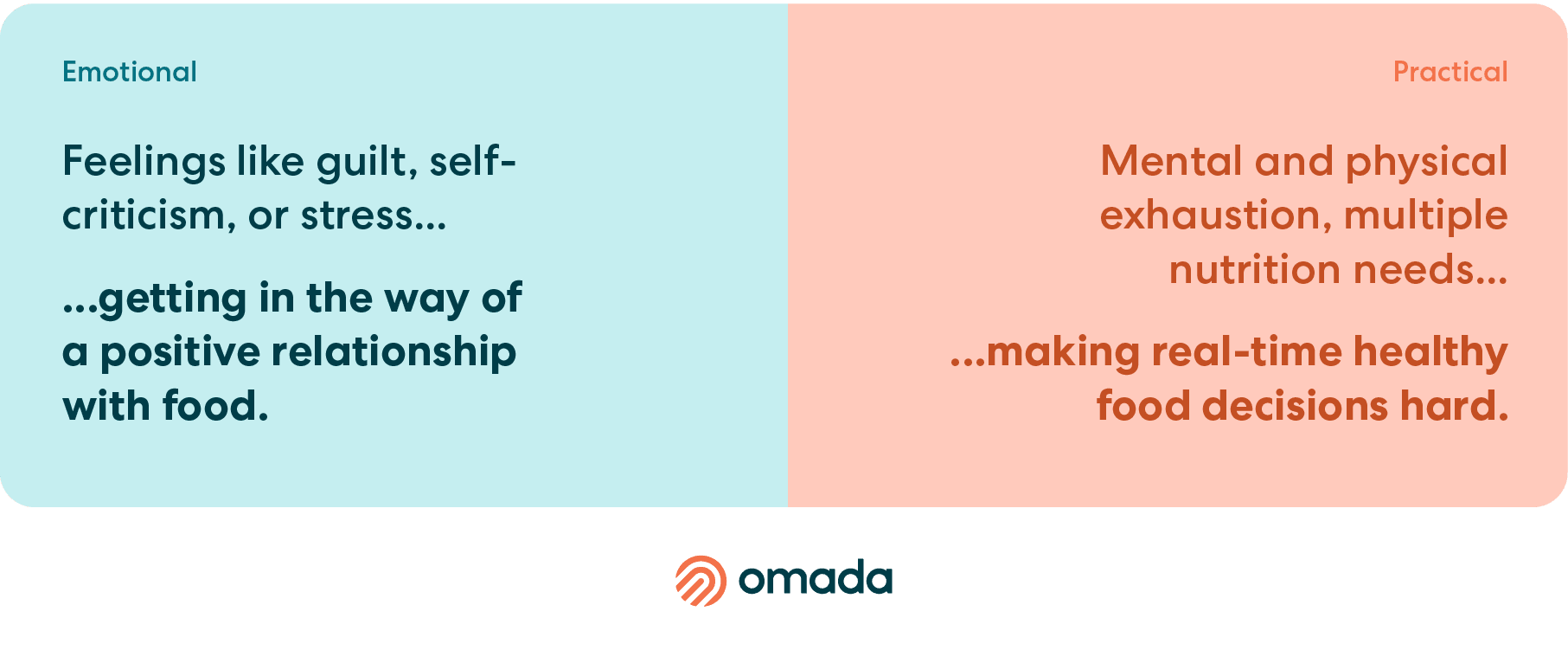
SL: This AI-powered motivational interviewing experience takes cues from the member on how deep they're ready to go, and gently guides them to find one place, one small step, where they do feel capable of diving in. This will become their first goal in Omada. In this way, we challenge the notion of all-or-nothing thinking, those big intimidating goals, like, "I have to lose 80 pounds," and we break that into nearer-term actions to build momentum by sprinkling the path to long-term health with lots of small successes.
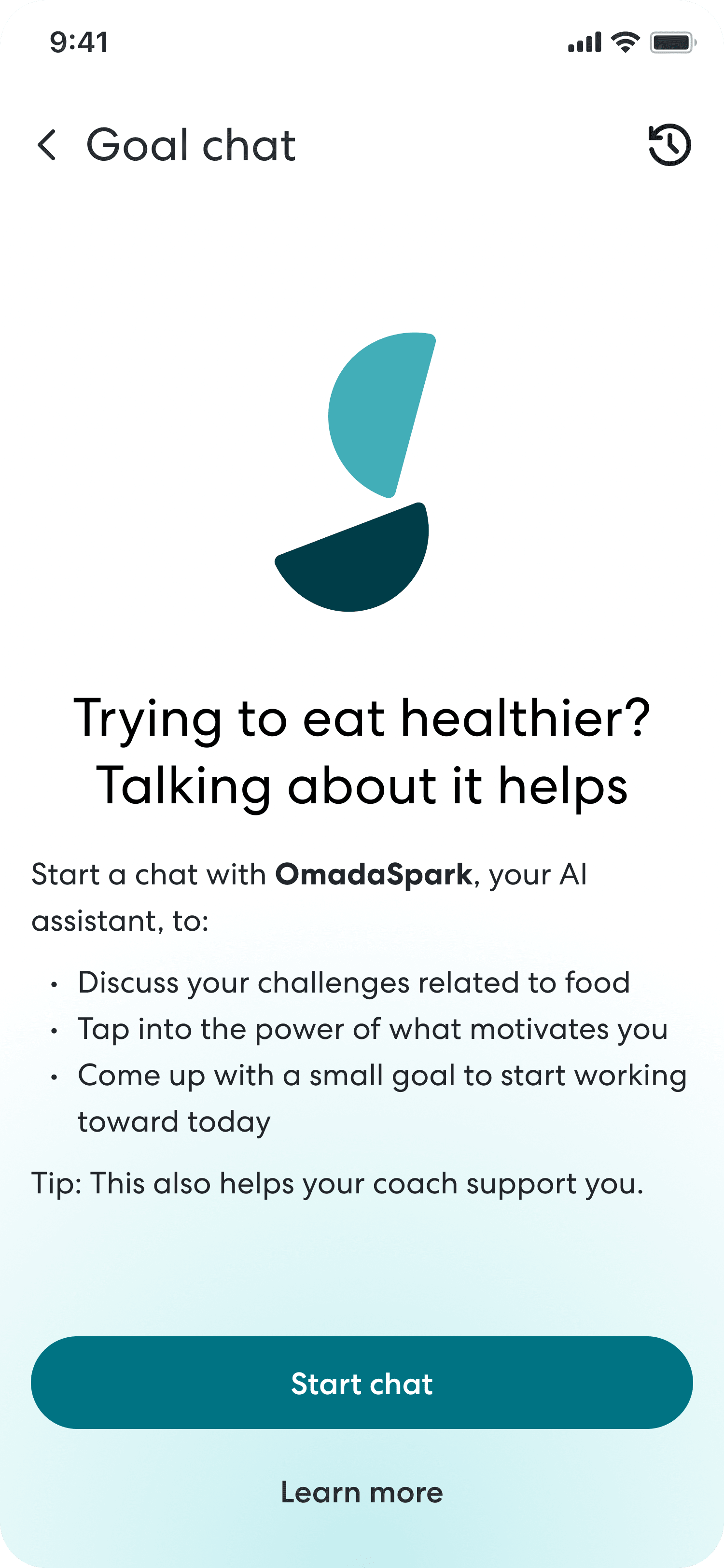
- Explore emotional triggers and motivations around food
- Set sustainable, focused personal goals
- Benefit from coaching informed by conversation summaries
OH: How do you see motivational interviewing as a tool to promote behavior change?
EC: Our core behavioral interventions with our human coaches remain the same. The real innovation? It’s in how we deliver them—and how we cut through shrinking attention spans and rising distractions to help people actually make sustainable change.
SL: Our coaches have always used this approach, but the time between responses in our async model can make it hard to really dig in with members in the moment when they need us the most. This tool benefits people who could benefit, not from more advice, but from a conversation that helps them with self-discovery about where they are in that moment, in real time, and in a way that helps them choose a small step that’s realistic on their journey to a healthier life.
AI Strengthens–not Replaces–a Human-Led Foundation
OH: These tools sound like we are really leaning into AI in our food experience. Does this fundamentally change something about Omada?
SL: I have a lot to say on this. Like any good scientist, I’m pretty skeptical by nature. But I’m truly wowed by Nutritional Intelligence. What we’ve built is more than just another food tracker. It’s a deeper, more powerful food experience that pairs the best of AI with the proven power of behavior change science and human-led care.
EC: Omada has always operated on a model of between-visit care. You can think of everything we’ve shared today as a progression of that vision – this time leveraging AI to maintain continuity of care between coaches – on nights, weekends, or when you just need a quick, trustworthy answer right now.
OH: Does Nutritional Intelligence replace the human-led nutrition support that members receive from their care teams?
EC: Not at all, it strengthens it. Some people worry that AI can’t possibly personalize at the level a human coach can. But we believe the opposite—when designed thoughtfully, AI can actually amplify the coach’s work. It catches trends, nudges at just the right time, and frees up our team to focus with the members on the moments that matter most. And don’t forget, we feed AI transcripts directly into the care team tool, so coaches have a rich new source of data on what’s top of mind for their members that they can expand upon to further the member/coach relationship.
SL: Exactly. It’s a powerful example of tech and human care working in tandem. We’re not replacing empathy—we’re scaling it. And in doing so, we’re helping people build healthier relationships with food that are grounded in autonomy, confidence, and consistency. That’s the real game-changer.
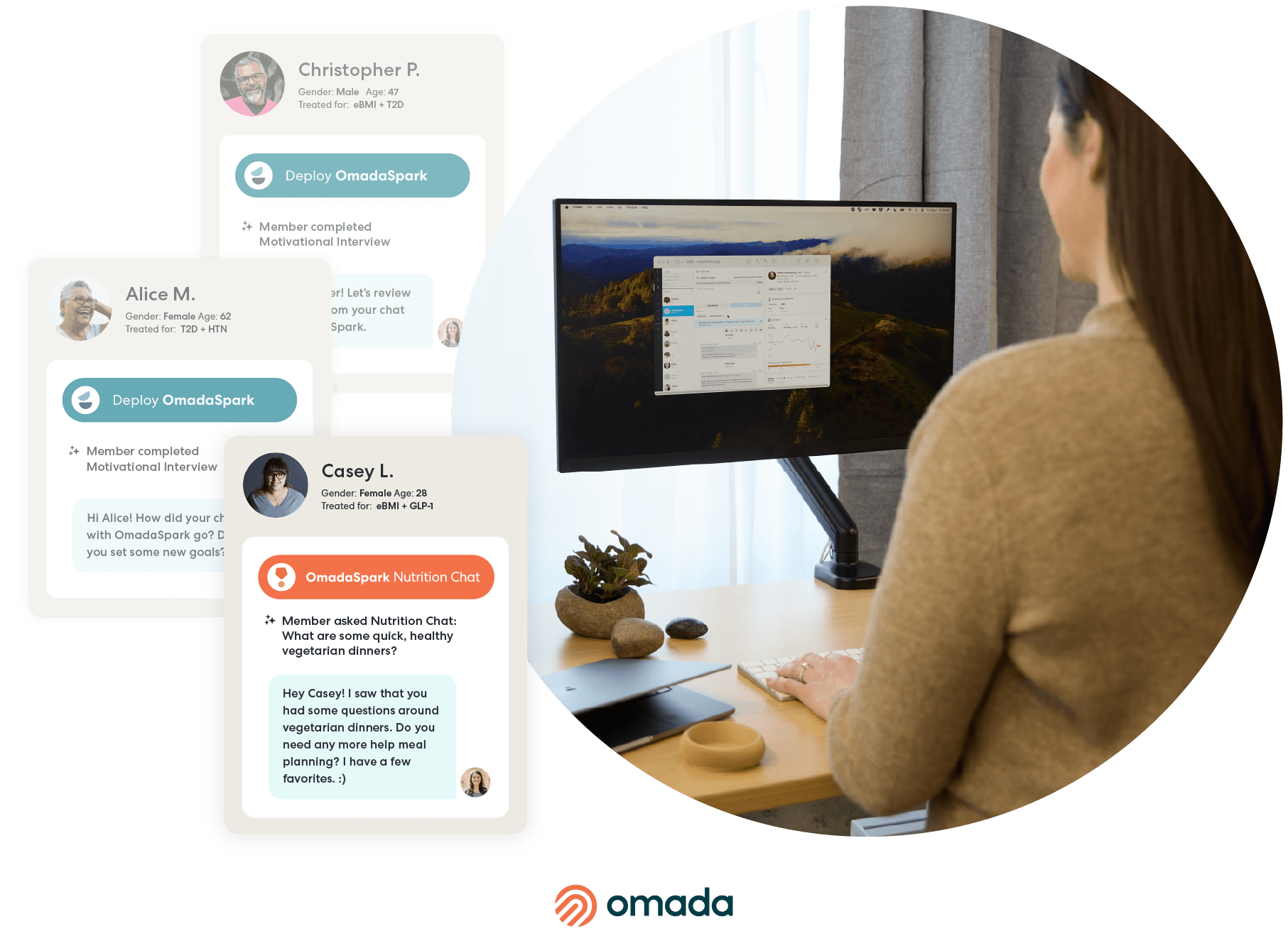
Images, including apps, do not reflect real members or information about a specific person.
Read Part One: Why Omada’s Product Team Developed a New In-App Food Experience